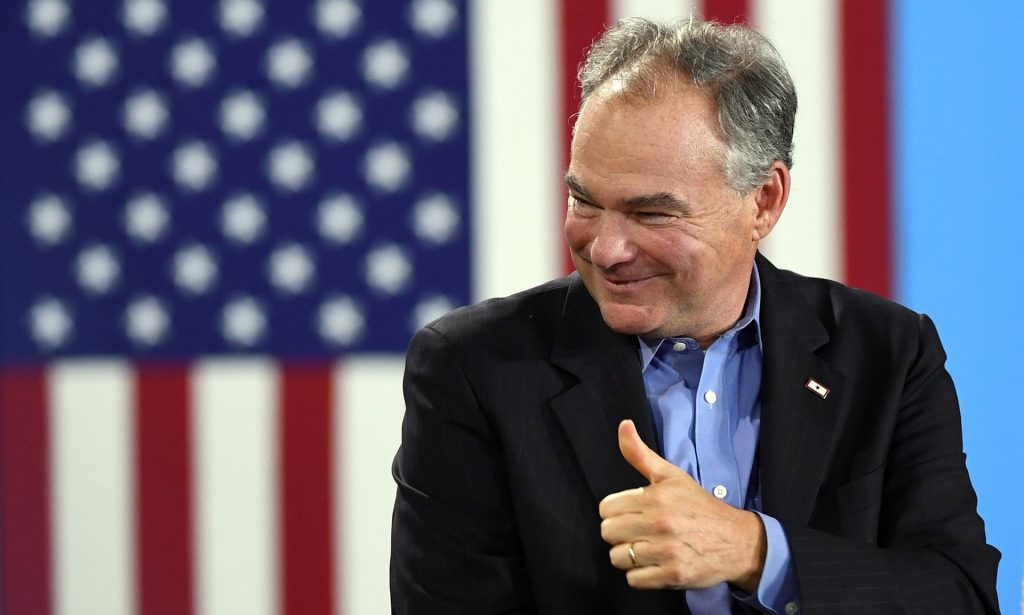In June 2013, as the Senate weighed an overhaul of the immigration system, Tim Kaine entered the chamber for a routine floor speech.
The Virginia senator, who was chosen on Friday as Hillary Clinton’s vice-presidential running mate, proceeded to do something no one had done before. He gave his remarks in another language: Spanish.
Noting that Spanish had been spoken in the US since 1565, when missionaries founded St Augustine, Florida, Kaine pointed out it was the language of nearly 40 million Americans “who have a lot at stake in the outcome of this debate”.
Starting on Saturday, Kaine will be thrust into an election defined in part by a debate over immigration. His fluency could prove an influential foil to Republica
n nominee Donald Trump’s hard line on immigration, as Democrats look to ensure that the Latino voters who have backed them in recent years turn up at the polls.
Kaine picked up the language working with Jesuit missionaries in Honduras in 1980, during a gap year while attending Harvard Law School. He then settled in Richmond, Virginia, where he spent nearly two decades as an attorney focusing on civil rights and fair housing.
Kaine launched his political career on the city council, then became the mayor of Richmond. He went on to win three elections in a red-leaning swing state, serving as Virginia’s lieutenant governor from 2002 to 2006 and governor from 2006 to 2010. He was elected to the Senate in 2012, after a stint as chair of the Democratic National Committee (DNC).
But Kaine has kept a low profile. He was last on the national radar as a finalist to join Barack Obama’s ticket eight years ago. He backed Obama over Clinton in the 2008 primary and remains close to the president.
His ability to stay clear of controversy is such that observers have called him a safe, bordering on plain pick. The man who in his free time enjoys playing the harmonica in a band called the Jugbusters gave an interview to NBC’s Meet the Press last month, in which he confessed to being “boring”.
On Friday even Republicans, whose message is that Clinton is untrustworthy, struggled to fault a man who has earned a Washington reputation as a nice guy.
“Trying to count the ways I hate @timkaine. Drawing a blank,” tweeted Jeff Flake, a Republican senator from Arizona. “Congrats to a good man and a good friend.”
The Republican National Committee reacted not by lobbing criticism, but by focusing on Kaine’s centrist record and accusing Clinton of falling back on commitments to progressives. While the attacks will ramp up as the general election officially gets under way, it was a fairly tame response for an announcement that has been seen in recent weeks as all but inevitable.
Rory Cooper, a Republican operative who was an aide to former House majority leader Eric Cantor, indicated Kaine’s record of reaching across the aisle, recalling how Kaine worked with his former boss on legislation related to research into cancer affecting children.
“Much like Joe Biden, Kaine brings a sense of being able to communicate with Republicans in areas of common ground,” Cooper said. “He’s a smart political pick who will be a formidable fundraiser, and will go a long way in helping fix a very broken DNC.”
Progressive problems
Kaine’s bipartisan relations extend even to his personal life – he married the daughter of Linwood Holton Jr, a former Republican governor of Virginia. But his even-handedness could cause rancor among progressives who were hoping Clinton would choose a running mate to reinforce the Democratic party’s most liberal platform in recent history.
The Progressive Change Campaign Committee, a grassroots organization with more than a million members, noted that Kaine had voted to fast-track the Trans-Pacific Partnership (TPP), the 12-nation trade pact negotiated by the Obama administration that is widely opposed by labor groups.
“It’s now more important than ever that Hillary Clinton run an aggressive campaign on core economic ideas like expanding social security, debt-free college, Wall Street reform, and yes, stopping the TPP,” said Stephanie Taylor, the group’s co-founder.
“It’s the best way to unite the Democratic party, and stop Republicans from winning over swing voters on bread-and-butter issues.”
Kaine is a devout Catholic, and his record on abortion has come under scrutiny. He has said he is pro-life, although his voting record has favored abortion rights. Nonetheless, several major pro-choice groups praised Kaine on Friday.
“Senator Kaine has been a strong supporter of economic opportunity for women – he has stood alongside our women in the Senate and fought for equal pay for women, raising incomes of American workers, and protecting access to healthcare through the Women’s Health Protection Act,” said Stephanie Schriock, the president of Emily’s List, a group that works to elect pro-choice women.
Planned Parenthood Action Fund president Cecile Richards said Kaine had proven in the Senate “that he will protect women from government interference when it comes to their right to safe, legal abortion” and highlighted his 100% rating on the women’s health organization’s political scorecard.
“Never before has a presidential campaign or party platform had a stronger commitment to reproductive health,” she said.
By and large, Kaine’s governing style has been perceived as amenable to compromise in an era of partisan gridlock.
As a result, his Republican opponents signaled on Friday that they will paint him as part of the status quo with which voters are frustrated. Trump’s campaign promptly nicknamed him “Corrupt Kaine”, accusing him of accepting gifts as governor.
Kaine has already shown he can hit back. Joining Clinton on the stump in Virginia last week, he warned of the implications of electing Trump.
“Do you want a ‘You’re fired’ president or a ‘You’re hired’ president?” he said. “Do you want a trash-talker president or a bridge-builder president?
“Do you want a me-first president or a kids-and-families-first president?”


